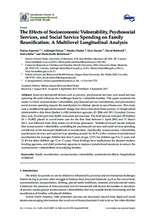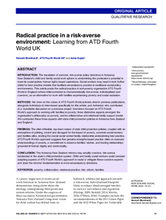Displaying 261 - 270 of 505
This report presents the results of a scientific research on the topic of Social Exclusion of Vulnerable Youth, commissioned by SOS Children’s Villages Netherlands.
In this study, the effects of the International Child Development Programme (ICDP) and the specific addition of a violence prevention module were observed in a preidentified population in Colombia where children are experiencing high levels of violence.
This study utilized data from the Fragile Families and Child Wellbeing Study to examine how kinship care affects maternal stress and parenting practices in racial/ethnic and immigrant families in the United States.
This paper examines the extent to which socioeconomic vulnerability, psychosocial service consultations, and preventative social services spending impacts the reunification for children placed in out-of-home care.
This paper examines the extent to which socioeconomic vulnerability, psychosocial service consultations, and preventative social services spending impacts the reunification for children placed in out-of-home care.
Drawing upon census data, this report shows that place, race, and poverty are intertwined concepts with particular implications for young children.
This paper presents the findings from a population-based, multi-stage random cluster knowledge, attitudes, and practices (KAP) survey of child caregivers in Liberia, revealing the primary reasons for parent-child separation and common misconceptions about alternative care.
All over the world, children are placed in orphanages because their families do not have the resources to care for them. In this short film, a mother makes the difficult decision to leave her daughter to the care of an orphanage.
This chapter explores how the failing system of traditional almajiri education, challenges associated with government efforts to integrate almajiri education into the formal school system, social exclusion and hostility contribute to increase the boys’ vulnerability to radicalisation and recruitment by Boko Haram.
This report examines and shares learnings from ATD Fourth World UK's social work practice framework with families experiencing poverty, discussing its strengths-based collaborative approach to build relationships and reduce power imbalances between practitioners and families. Implications for the feasibility of implementing this framework in child protection social work practice and policy in Aotearoa New Zealand is also addressed.




